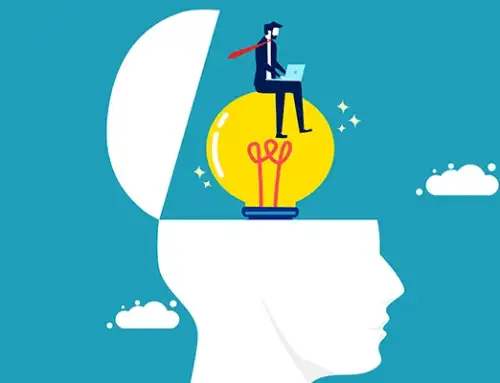Why is it important to give your brain a break
We all know the importance of eating well and exercising, but we’re less aware of the equally crucial importance of rest for our well-being. Difficulties with concentration, lack of motivation, or mental wandering are often part of our daily lives. Yet numerous studies have shown that a lack of rest and periods of disconnection can severely affect our mental and physical health. However, it’s not enough to simply want to rest for our “noggin” to follow suit. In fact, understanding the brain’s modus operandi is essential to be able to rest and recover intelligently. Here are some concepts that will help you replenish your cognitive resources.
Athletes’ “Strategic” Rest
The world of sports has long placed great importance on rest, and we should take inspiration from it. A good training program includes planned recovery periods by the coach to optimize athletes’ performance. “Recovery is well-known in sports; it’s not to be taken lightly. It’s part of the training. It’s not ‘nothing.’ Rest is strategic,” emphasizes Dr. Guillaume Dulude, a neuropsychologist, in his video capsule How to Really Rest! Having been a high-level swimmer himself, he reminds us that “athletes who are unable to rest, even if they do less sport, tend not to recover to their full potential before a competition.”
Understanding the Brain’s “Active” and “Resting” Modes
Our brain operates in two main modes, each corresponding to a specific neuronal network: the “executive network” and the “default network” (DN), also called the “default mode network” (DMN). The first is associated with the brain’s active mode, while the second corresponds to its resting mode.
We use the term “networks” because they are networks of neurons involving brain regions that may be distant from one another. Several hypotheses have been proposed to explain the basis of this back-and-forth process between the two networks. Some researchers suggest it could be an energy-saving strategy similar to putting a computer to sleep, while others believe it might be a way to maintain minimal activation of certain neuronal connections to prevent them from disappearing. Other researchers lean toward the idea that this mechanism could help us better cope with any eventuality.
An Overworked Cognitive Machine
The executive network, located in the prefrontal cortex, manages our most complex cognitive functions, such as attention, working memory, and our abilities to plan and solve problems. This network is activated when we engage in a specific cognitive activity. Alongside it, another neuronal network is activated—the “error detection system,” which includes areas like the anterior cingulate cortex, the amygdala, and the insula. This system plays an essential role, among others, in processing emotions, which are inseparable from our cognitive processes.
All these brain regions deploy energy daily to enable us to achieve our goals. Our working memory and error detection system are particularly solicited. The latter must constantly be on alert to warn us when our strategies seem to move us away from our goals. Moreover, having to juggle multiple objectives, each supposed to be as high a priority as the others throws a wrench into the gears of our cognitive machine.
Spending Half the Day “Daydreaming”
Our executive network is thus extremely solicited, but it’s common for our thoughts to escape, giving way to daydreams or mental wandering. According to a Harvard University study, we spend an average of 46.9% of our day “daydreaming,” a state that corresponds to the brain’s default mode network. Although it is not the only functional network in the resting state, it is the one with the highest energy consumption and the strongest and most constant connections.
When Concentration Keeps Fatigue at Bay
When we are fully involved in an activity without dividing our attention, it doesn’t necessarily lead to fatigue, as explained by Jean-Philippe Lachaux, a researcher in cognitive neuroscience and an attention specialist: “By being totally involved in what we’re doing, without trying to do several things at once, we also reduce conflicts in the brain: there’s no longer any doubt about what is important and what isn’t. […] There’s no negative interference between brain regions involved in cognitive processes that contradict each other. This results in a feeling of calm: what we commonly call mental overload decreases.” Here, we can draw a link between this state of engagement and the state of flow—”a psychological state of deep well-being, intense concentration, and motivation, which is achieved when an activity is perceived as a challenge equal to or slightly above the skills one possesses.”
Seeking Flow Moments
Flow can be achieved in various types of activities, such as cooking, reading, or music, but according to Mihaly Csikszentmihalyi, the psychologist who developed this concept, there is one activity particularly suited to this state: yoga. “In fact, it makes sense to think of yoga as a well-planned flow activity. Both attempt to achieve joyful and selfless involvement through concentration, which is in turn made possible by a discipline of the body,” he explains in his seminal work, Flow: The Psychology of Optimal Experience (1990).
Protecting Against Chronic Stress
In our modern lives, stress and anxiety are often obstacles to the flow state. These states can interfere with our cognitive abilities, as neuroscientist Sonia Lupien points out: “Faced with a stressful element, the body produces stress hormones that serve to fight or flee. These hormones reach the brain and have a marked preference for certain regions involved in learning and emotion regulation.” When a disruptive event occurs, all of an individual’s attention is captured by it, explained Lupien and her colleague Françoise Maheu in their 2003 study. Animal research has also shown that stress and anxiety can even block the learning process.
Moreover, as described by Dominique Servant, a psychiatrist and psychotherapist specializing in stress and anxiety, fatigue is among “the first signs indicating a difficulty in adaptation (negative consequences of stress), when the body can no longer ‘recharge its batteries.'” This sensation of mental fatigue could also be partly attributable to a drop in various neurotransmitters that haven’t had time to be replenished.
Sonia Lupien recommends adopting daily cognitive micro-breaks, giving our stress hormones time to decrease. “If I’m having trouble concentrating, I get up and go walk the dog, for example. The cognitive micro-break is essential, especially in these stressful times,” the researcher reminds us.
Keeping Helplessness at Bay
When fight or flight doesn’t seem feasible, the feeling of helplessness looms. In his video capsule How to Rest and Disconnect from Work?, Guillaume Dulude warns us that ignoring how the brain rests—the “rules” to follow for it to succeed—puts us at risk of experiencing this state. “When we overuse the same systems and therefore don’t have rest, we experience helplessness,” he explains, noting that this feeling is one of the greatest generators of negative emotions in humans.
This feeling of helplessness can affect our cortisol levels, the stress hormone, as well as our serotonin levels, an essential neurotransmitter for regulating positive emotions, including the ability to make choices, be vigilant, accomplish tasks, switch effectively from one task to another, and disconnect. While a high feeling of helplessness goes hand in hand with an inversely low serotonin level, the neuropsychologist reminds us that “we need a minimal pool (level) of serotonin in the brain, mainly in the frontal and prefrontal lobes—that is, in the executive center.”
Beware of Rumination, Even on Vacation
The Harvard study mentioned earlier reported that the more we daydream (in default mode network), the more we tend to be unhappy, and conversely, the more we are invested in an activity, the more satisfied we feel. It’s not uncommon for a healthy person to have this network become overactive, leading them from daydreaming to rumination, thus putting them at greater risk of attention disorders, anxiety, and depression.
According to Jean-Philippe Lachaux, we must be vigilant in this regard even on vacation: “It’s not necessarily restful to be sitting on a beach or facing a mountain landscape if we spend all our time lost in past or future scenarios. […] By releasing our grip on our schedule and mental activity, vacations, therefore, leave more time for these empty moments without a specific goal. This can be pleasant, but be careful not to fall into the trap of rumination.”
Cultivating Healthy Mind Wandering
In addition to trying to calm the activity of the default mode network and allowing the executive network to renew its depleted neurotransmitters, it would also be wise to cultivate healthy mind wandering. “It is increasingly evident that this undirected thought is crucial for consolidating one’s identity and giving meaning to one’s life. Unfortunately, in the daily grind, we are often too busy accomplishing one task after another, which prevents us from indulging in what I call constructive internal reflection,” reminds neuroscientist and psychologist Mary Helen Immordino-Yang (2012) in the Québec Science article “The Brain Also Needs Vacation.” According to her, the brain’s flexibility to switch from executive mode to default mode and vice versa, as well as the robustness of default network connections, are linked, among other things, to a greater sense of well-being. Ideally, in our moments of rest, we should also allow ourselves to engage in deeper and more constructive reflections about ourselves.
Meditation as a Solution
For most of us, it is possible to prevent the default network from overheating. Studies have indeed shown that meditation, particularly mindfulness meditation—where one focuses on one’s breathing and inner state—can decrease activity in the default network (Garrison et al., 2015), strengthen its connections (Zeidan et al., 2010), and promote executive functions and sustained attention (Valentine and Sweet, 2007; Zeidan et al., 2010). The benefits could be felt quickly, after a few weeks or even just a few days of practice.
However, by trying too hard to chase away thoughts, they may, on the contrary, invade us even more. “It’s not about blocking thoughts and emptying… that doesn’t work!” asserts Buddhist monk Matthieu Ricard, who has been meditating for decades and collaborates on neuroscience research on the effects of meditation on the brain and health. In meditative practice, the right approach, according to him, is to “let thoughts pass like birds crossing the sky.” Easier said than done! With practice, all hopes are permitted since the brain, at any age, has this ability to modify itself following new learning, called “neuroplasticity.”
Intermediate Mental Activities
Besides the idea of integrating meditation into one’s lifestyle, we would benefit from respecting certain criteria when choosing an activity on vacation. “Having only one thing to do and only one, within a reasonable time and without excessive focus on our performance,” is what Jean-Philippe Lachaux recommends. He suggests turning to a type of mental activity he calls “intermediate,” such as Sudoku, crosswords, simple walks, colouring, and other creative hobbies. “Of course, the mind sometimes wanders into thoughts, but it is regularly brought back to its main task. Vacations are then an opportunity to give ourselves only one thing to do at a time, without obligation of result, and perhaps that’s their secret. A resting brain is not so much an inactive brain (that’s impossible) as a brain totally involved in its current activity, without other perspectives,” adds Lachaux.
To Recover, Engage Another System
According to Guillaume Dulude, for the brain to truly recover, the chosen activity must get us out of our habits and be planned. “In a rest strategy—vacations—we must ‘strategically’ ensure that we will not solicit the same cognitive structures, the same reflexes, the same thinking systems, the same habits that we normally use when we work when we expend energy,” explains Dulude.
Adopting a Strategic Approach
If Guillaume Dulude insists on the importance of a strategic approach, it’s because, without a conscious and planned effort on our part to get out of our comfort zone, the brain tends to reproduce behaviours it knows well and that have earned it a reward—a dopaminergic reinforcement. “It’s not that simple because the brain likes it; it’s used to getting its dopamine in a certain way, and often when we officially go on vacation, we feel like doing the same things as when we’re not on vacation,” warns the neuropsychologist.
Recognizing Passive Activities
Beware! Going for a drink, eating at a restaurant, or going to the movies doesn’t work since these activities are passive, warns Dulude, noting that this is also one of the reasons why the activities we often favour on vacation are not those that provide the most effective rest. “Anything that is passive or exogenous doesn’t work. I’m not saying you shouldn’t do it; I’m just saying that the brain won’t relax in the same way because it’s too easy—’ consumption.’ So anything that’s consumption, that is, external reinforcement, anything psychotropic, will give superficial, short-term rest but won’t recharge. There won’t have been enough depth in the fact that the brain deactivated in a task,” he explains. We must, therefore, favour activities that require real personal involvement.
Developing a Range of Interests
Ensuring that our brain recharges paradoxically requires effort—effort that can represent quite a challenge for those who tend to invest in a single activity, often their professional activity. This prompts Dulude to recommend, in a global strategic approach to rest and a healthy lifestyle, also diversifying our interests: “For me, it’s a central theme. People who, for various reasons, have invested in few areas in their lives, who are extremely good at something but have little diversification—so who can give a lot of energy in a single field—but when the battery is burned out, it’s ‘burned out’… it takes a long time to recharge. We see many in consultation.”
Novelty and Learning
For those put off by the idea of having to get out of their comfort zone to manage to rest, the neuropsychologist suggests going gradually, the best strategy being, according to him, to explore activities that may have tempted us but that we haven’t yet had the chance to try—to see this perspective as a gift, an opportunity to try something new. “The brain loves that: novelty and learning are the best rejuvenation strategy that exists!” concludes Guillaume Dulude.



